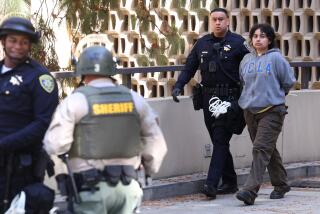Student Resistance Persisting in Iran
- Share via
TEHRAN — Mounting a challenge to the Islamic Republic’s religious leaders, students have launched a campaign of peaceful civil disobedience on university campuses across Iran, demanding the release of dissidents and calling for an end to five years of political paralysis on reform.
Thousands of students mobilized Wednesday for a fifth day of sit-ins, this time on the tree-lined campus of Amir Kabir University of Technology, the capital’s leading technical institute, which is often compared to MIT.
Organizers said they intend to continue the demonstrations and sit-ins until Students’ Day on Dec. 5, which would make this the longest sustained opposition protest since the country’s 1979 revolution.
The demonstrations in Tehran differ from protests in 1999 that led to bloody confrontations and deaths when students tried to march off campus. This time, students are calling for calm and have shifted the sit-ins daily among campuses, with students from other universities marching to join them.
“We’re not looking for another revolution,” said Yashar Ghajar, an organizer from the Islamic Students Assn. and one of several speakers. “We’re looking for freedom of expression -- and freedom after expression.”
The trigger for the protests was the death sentence handed down last week against leading reformer and popular history professor Hashem Aghajari for questioning the powers of Iran’s hard-line clergy, who ultimately control the country. The charges also included blasphemy against the prophet Muhammad.
But the protests have quickly taken on a broader agenda and spread to half a dozen cities, including Isfahan, Tabriz and Hamadan. Many professors have not shown up for classes, indicating their support for the students, analysts here say.
“Our main goal is not just the Aghajari case. This is a protest against the regime’s behavior, especially on human rights, and the closed political atmosphere throughout the country,” said Roozbeh, a 21-year-old mechanical engineering student who asked that his surname be withheld.
“We’ve waited five years for change and little has happened,” he said of the 1997 election of President Mohammad Khatami, who pledged major democratic reforms but has repeatedly been blocked by religious conservatives who have veto power over the president and parliament.
Khatami weighed in Wednesday on the verdict, saying it “never should have been issued at all.” He then called for the case to be settled.
“Under the current circumstances, no measures should be taken that promote tension,” he said after a Cabinet meeting, Iranian television reported. Over the weekend, almost two-thirds of parliament, also dominated by reformers, urged the judiciary to overturn the death sentence.
But students say they are now increasingly unhappy with Khatami and other reformers, despite support for their political ideas.
“The whole student body is unhappy with Khatami, not because he’s not an honest man. But we need more than honesty. We need someone who solves our problems,” said a 21-year-old engineering major who requested anonymity. Leaders of the 1999 protest are still in jail.
Students’ main target, however, is the bloc of hard-liners. Protesters this week have shouted slogans aimed at them, including “Death to the Taliban, in Kabul and Tehran,” a reference to the rigid religious movement that ruled in Afghanistan until the U.S. forced it from power last year.
Aghajari got into trouble for a June speech in Hamadan, the historic center of Iran, for suggesting that Islam could be interpreted or adapted according to the times and that interpretations by earlier clerics were not necessarily sacred. He was tried in a closed court without a jury and sentenced to be hanged.
Through his attorney, Aghajari said Wednesday that he would not appeal the death sentence. That decision, analysts here said, could force the government to back down or face even greater unrest.
The student protest also defied a tough warning from the supreme leader, Ayatollah Ali Khamenei, who has the ultimate veto in Iran.
“The day when the three branches of government are unable to settle major problems, the supreme guide will, if he deems it necessary, make popular force intervene,” Khamenei warned, according to the Islamic Republic News Agency.
The popular forces are Iran’s Revolutionary Guards; the Basij, or volunteer Islamic militia; and other militant arms of the regime’s conservatives.
But even the Basiji have questioned the Aghajari verdict. “This sentence is so unconventional that it has raised a lot of questions,” said their letter to Iran’s judiciary, according to reports in Iran’s press and a copy posted on the Amir Kabir campus. The letter called for the sentence to be revoked and the punishment reconsidered.
Students were almost buoyant about their prospects, even though police conspicuously surrounded the university.
“Students are tired of this government and want to shout against them. No one in history has been able to block the trend of freedom and common sense,” said Keivan Ansarai, a doctoral candidate in chemical engineering.
“Before, the protesters were like lions who roared about freedom,” Ansarai said. “They were put in jail and tortured. Now, these protesters are like canaries who sing about freedom and rights. They may not be as tough as the lions, but they will be successful because of their enormous numbers.”
More to Read
Sign up for Essential California
The most important California stories and recommendations in your inbox every morning.
You may occasionally receive promotional content from the Los Angeles Times.













